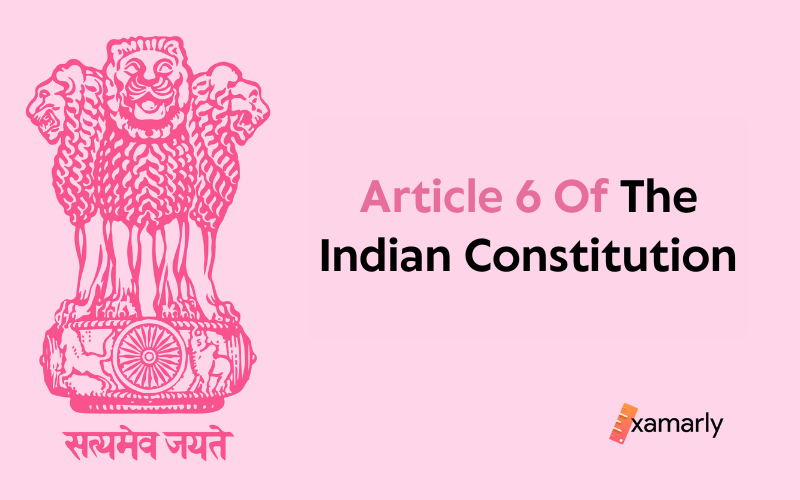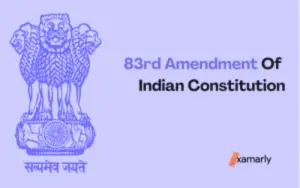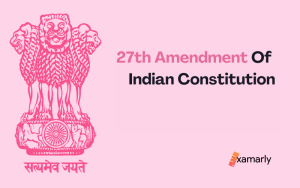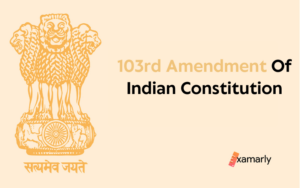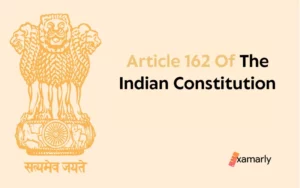Article 6 of the Indian constitution deals with migratory issues. In 1950, our country’s constitution went into effect. There is a preamble and 470 articles divided into 22 parts. Article 5 of Part 2 of the constitution discusses citizenship.
This article will give you the basics of article 6 of the Indian Constitution and the termination of citizenship. It also gives you a brief history of this article 6. Read it as it is beneficial in your UPSC Exam preparation.
What Is Article 6 Of The Indian Constitution?
When India and Pakistan were divided, Article 6 of the constitution discusses citizenship. It was about the citizenship of those who migrated from Pakistan to India. The partition had a deadline, which was July 19, 1948. According to Article 6, at the time the Constitution took effect, anyone who had immigrated from Pakistan would have been an Indian citizen if:
- Following the 1935 Government of India Act- the person, his parents, or his grandparents (paternal or maternal) were born in India.
- (a) if the immigrant arrived before July 19, 1948, and has lived in India regularly since their migration, or
(b) any person who moved from Pakistan shall be a citizen of the country of India at the moment the Constitution is enacted if they relocated after July 19, 1948, and they have been registered as Indian citizens by an officer hired in that regard by the government of the Indian Dominion on an application produced by them in that respect before the Constitution is enacted; provided, however, that no individual shall be so registered unless that person must have lived in India for at least six months prior to the application date.
The rights of citizenship are covered by Articles 5 through 11. Check out the linked article provided below to learn more about all of these articles about citizenship for Indian citizens as well as other noteworthy articles.
History
The country was divided into two pieces, one of which was India and the other was Pakistan, whenever a case for autonomy was made. People were granted the freedom to emigrate to any nation to match their ethnicity. In this way, the situation called for strict measures to lay out India’s identity policy before the start of the constitution.
Cases That Matter for Article 6
- In this section, the term “relocated” was defined for the case of Kulathil Mammu v. Province of Kerela. The term was deemed to imply a deliberate and lifelong departure from India to Pakistan.
- In the State of Bihar v. Kumar Amar Singh, the spouse abandoned her partner and traveled to Karachi. She claimed that she had short-traveled to Karachi for medical attention. She eventually returned to India at that moment and was permitted to stay after stating that she was a resident of Pakistan. Then, following the end of the period, she returned to Pakistan. When her property in India was going to be taken into custody, she needed to obtain permanent citizenship in India. She will not be granted permanent citizenship because she moved before the date specified in the agreement, it was decided.
- In the case of State of U.P. v. Rehmatullah, it was decided that the Central Government is authorized to take action against people who have obtained foreign citizenship and have lost their Indian citizenship but are still residing in the nation.
- The Ebrahim Vazir Mavat v. State of Bombay case advanced the sanctity of the inundation under the Pakistan Control Act, of 1949. According to this law, a person who owns a residence in either India or Pakistan is not permitted to enter the territory of either nation without authorization. Additionally, anyone who deviates from the norm will be held accountable for the offense mentioned in the presentation. The Central Government may refuse citizenship to a person for a specific reason, as stated in Section 7.
It was decided that expelling a resident from the nation following Section 7 of the Indian Constitution would make Part II’s guarantee of citizenship more difficult to exercise.
Revisions Year Astute
The Citizenship (Amendment) Act of 1986
According to the provisions of this modification, a person who was not born in India would be granted citizenship. However, both guardians must be Indian citizens at the time of the person’s introduction.
The Citizenship (Amendment) Act of 1992
It said that if a person is born after January 26, 1950, but before the start of this Act, then at that point, he would be an Indian citizen. But his ancestors must have been Indians at the time of the person’s conception.
Brief details Of Article 6 Of The Indian Constitution
Citizenships
A person’s relationship with their country or state, to which they owe loyalty and for which they are thereafter entitled to its protection, is defined as citizenship. Citizenship denotes an individual’s state of freedom and the corresponding obligations.
Provision Laid By The Constitution Under The Citizenship Of India
The Indian constitution addresses individual citizenship in Articles 5 through 11.
The 1935 Citizenship Act covers Indian Citizenship. In 1986, 1996, 2003, and now 2005, it was amended.
Indian nationality is determined by Jus Sanguinis. It denotes citizens under the blood.
Termination Of Citizenship
There are three ways to revoke an individual’s citizenship:
- If the citizen also possesses citizenship from another nation.
- if a citizen of India freely takes on the citizenship of another nation.
- The Indian government stripped the person of their Indian citizenship.
Amendments In Article 6 Over The Debate Summary
- The first portion of Article 6 was to include a phrase that read “on account of disturbances, civil disturbances or fear of disturbances”. But it was only suggested by members of parliament.
- Another person wants to add that people should be treated with great privilege and not as disposable objects.
- Few members were in favor of adding a “code of nationality law”. It was unmatched and never appeared in the constitutions of other nations. It was decided to include this amendment. It was done as Article 5a after there was a discussion.
Conclusion
Article 6 of the Indian constitution speaks about the migration of individuals from Pakistan during the partition of India and Pakistan, who are assumed to be citizens of India at the start of January 26th, 1950, if they meet the conditions specified in the article.
FAQs
What Does Article 6 Of The Constitution Of India Deal With?
Article 6 of the Indian Constitutiondeals with the nationality rights of some people who have moved to India from Pakistan.
Which Article Defines Citizenship?
Article 5 to Article 11 of the Indian Constitution deals with the citizenship of India. These are as follows:
1. Article 5 addresses Citizenship at commencement of the Indian Constitution.
2. Article 6 addresses the Rights of citizenship of some individuals who have moved to India from Pakistan.
3. Article 7 addresses the Rights of citizenship of certain migrants to Pakistan.
4. Article 8 addresses the Rights of citizenship of some Indians who reside outside of India.
5. Article 9 addresses that people who voluntarily become citizens of another country are not considered citizens.
6. Article 10 states that the Rights of citizenship of individuals remain in effect.
7. Article 11 deals with the Parliament regulating the right of citizenship by law.
What Was The Main Purpose Of Article 6 Of The Indian Constitution?
The main purpose of this article is to provide citizenship of India to the people who migrated to India from Pakistan.
What Sorts Of Citizenship Are There In India?
According to the Ministry of Home Affairs, Indian citizenship can be obtained in four ways:
1. Citizenship by registration
2. Citizenship by descent
3. Citizenship by naturalization
4. Citizenship by birth
The Citizenship Act of 1955 lists the provisions in sections 3, 4, 5(1), and 5(4).
Who Is the Indian Constitution’s Father?
Dr. Bhimrao Ramji Ambedkar is referred to as the father of the Indian Constitution.
Is Dual Citizenship Permitted In India?
According to the Indian Constitution, you cannot simultaneously possess Indian and foreign citizenship. The Indian government agreed to give overseas citizenship of India (OCI) on the advice of the High-Level Committee on Indian Diaspora.


